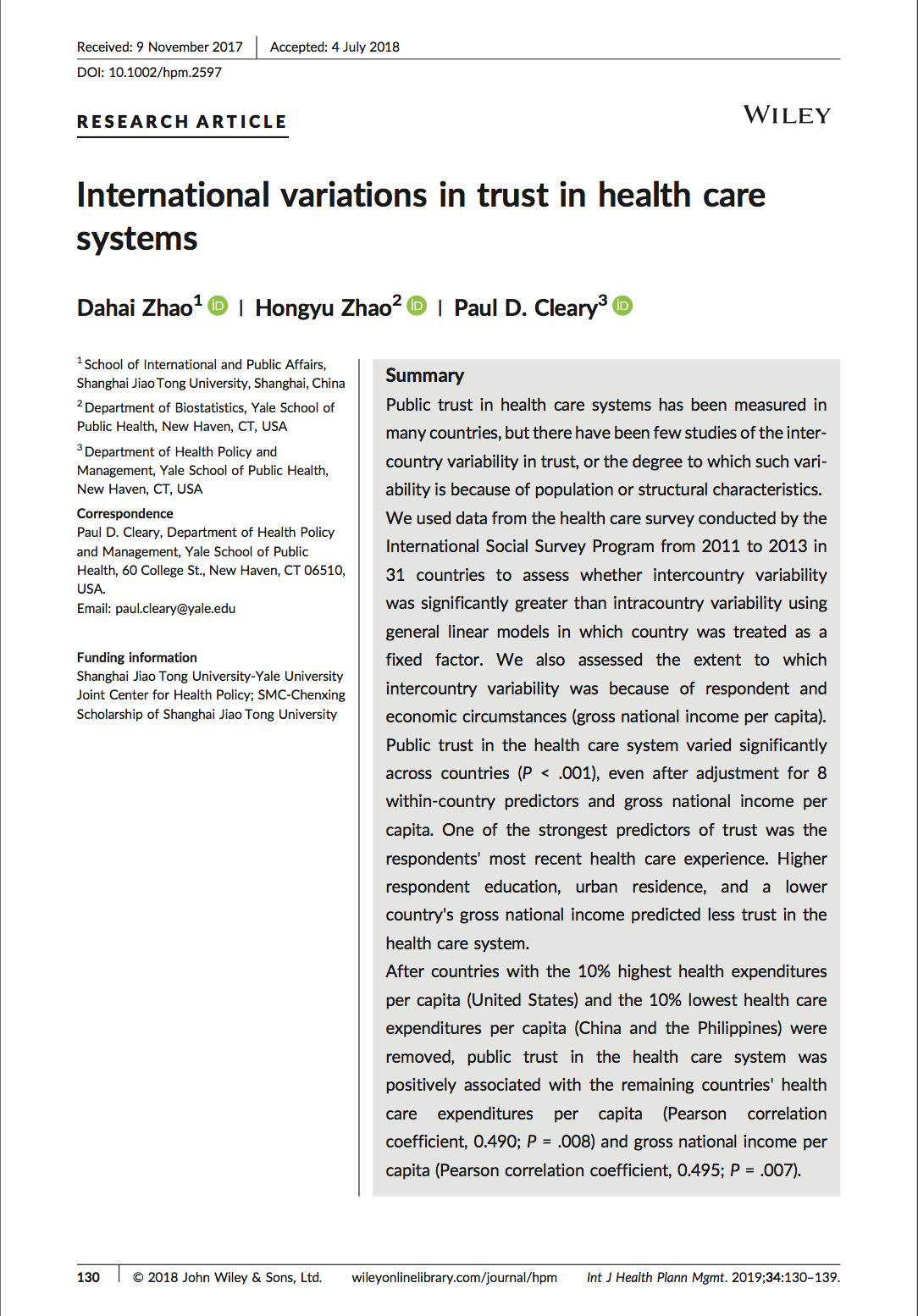Title: International Variations in Trust in Health Care Systems
Authors: Dahai Zhao, Hongyu Zhao, Paul D. Cleary
First published: 15 August 2018
Cite this article: Zhao D, Zhao H, Cleary PD. International Variations in Trust in Health Care Systems[J]. International Journal of Health Planning and Management. 2019, 34: 130–139. https://doi.org/10.1002/hpm.2597
Summary
Public trust in health care systems has been measured in many countries, but there have been few studies of the intercountry variability in trust, or the degree to which such variability is because of population or structural characteristics.
We used data from the health care survey conducted by the International Social Survey Program from 2011 to 2013 in 31 countries to assess whether intercountry variability was significantly greater than intracountry variability using general linear models in which country was treated as a fixed factor. We also assessed the extent to which intercountry variability was because of respondent and economic circumstances (gross national income per capita).
Public trust in the health care system varied significantly across countries (P < .001), even after adjustment for 8 within-country predictors and gross national income per capita. One of the strongest predictors of trust was the respondents' most recent health care experience. Higher respondent education, urban residence, and a lower country's gross national income predicted less trust in the health care system.
After countries with the 10% highest health expenditures per capita (United States) and the 10% lowest health care expenditures per capita (China and the Philippines) were removed, public trust in the health care system was positively associated with the remaining countries' health care expenditures per capita (Pearson correlation coefficient, 0.490; P = .008) and gross national income per capita (Pearson correlation coefficient, 0.495; P = .007).
There is significant variation in public trust in health care across the countries studied. The intercountry differences are due, in part to economic circumstances.
Keywords
Patient Experiences, Trust in Health Care
以下是参考中文翻译:
研究文章
题目:卫生保健系统信任的国际差异研究
作者:赵大海,赵宏宇,Paul Cleary
首次出版:2018年8月15日
引用本文:Zhao D, Zhao H, Cleary PD. International Variations in Trust in Health Care Systems[J]. International Journal of Health Planning and Management. 2019, 34: 130–139. https://doi.org/10.1002/hpm.2597
摘要
许多国家已经对卫生保健系统的公众信任进行了测量,但是很少有关于国家间信任差异的研究,以及关于这种差异在多大程度上是由人口或结构特征造成。
我们使用2011年至2013年国际社会调查计划在31个国家进行的卫生保健调查数据,来评估国家间的差异是否显著大于国家内部的差异,使用的是线性模型,其中国家被视为一个固定因素。我们还评估了国家间差异在多大程度是由于受访者和经济状况(人均国民总收入)造成的。
即使在对8个国家内部预测指标和人均国民总收入进行调整之后,各国对卫生保健系统的信任度也存在很大差异(P < .001)。信任感的最强预测因素之一是受访者最近的卫生保健经历。较高的教育程度,城市居住地以及较低的国民总收入预示着受访者对卫生保健系统的信任度较低。
去除人均卫生保健支出最高10%的国家(美国)和最低10%的国家(中国和菲律宾)后,公众对卫生保健系统的信任与其余国家人均卫生保健支出(Pearson相关系数0.490;P = 0.008)和人均国民总收入(Pearson相关系数0.495;P = 0.007)正相关。
在所研究的国家中,公众对卫生保健的信任度存在显著差异。国家间差异部分是由于经济情况造成的。
关键词
患者经历,卫生保健信任


